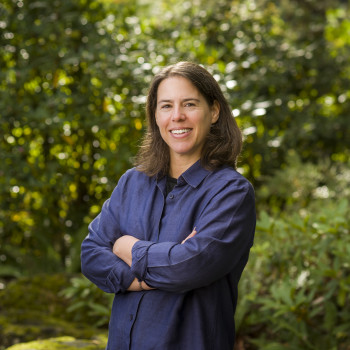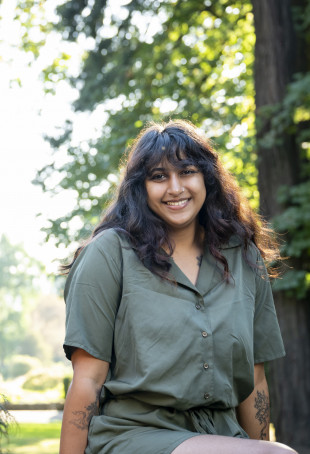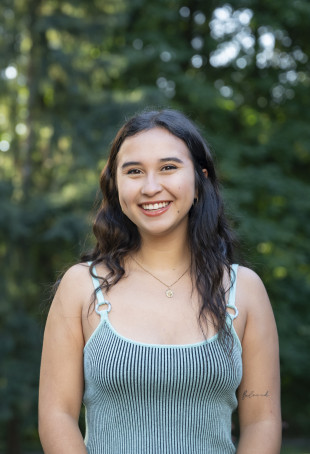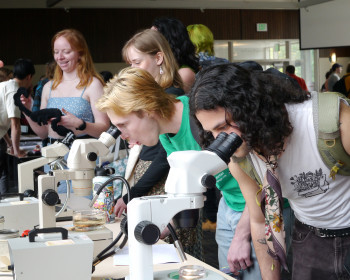20th Annual Ray Warren Symposium Focuses on Building a Just Future
This year’s Ray Warren Symposium on Race and Ethnic Studies, slated for November 8-10, will explore race and personal identity through the theme of BIPOC futurism.

by Gabe Korer BA ’23
The 20th annual Ray Warren Symposium on Race and Ethnic Studies, which will be held November 8-10, features a variety of interdisciplinary events touching on race and personal identity. In recognition of the symposium’s 20th anniversary, this year’s theme will center around BIPOC futurism, which reimagines a society built around a liberating and just future.

20th Anniversary
The student cochairs of this year’s Ray Warren Symposium are Lucinda Law BA ’24 and Mithila Tambe BA ’25. In striving to honor the symposium’s legacy, Law and Tambe wanted to examine what an ideal future might look like as envisioned by BIPOC individuals.
“We thought BIPOC futurism was a perfect theme for the 20th annual Ray Warren Symposium,” Law says. “There’s no way to think about the future without also looking into our past and learning from past years and traditions.”
The Ray Warren Symposium was established by students in 2004 as a way to honor the work of Ray Warren BS ’65, MAT ’71, who was director of ethnic student services at Lewis & Clark in the 1990s. Warren promoted diversity at the college through recruiting and supporting students of color. Over time, the symposium has developed into a space where students can explore a variety of topics related to race and identity.
“These conversations transcend the three or four symposium days, and I think that’s very valuable,” Tambe says. “The fact that the symposium has been sustained for 20 years means that these conversations are continuing outside of the event, and that’s kind of what we’re trying to achieve as well.”
- Mithila Tambe BA ’25
I applied for the Ray Warren Symposium cochair position because I wanted to give back and contribute to the one initiative, community, and space on campus that has made me feel the most seen and heard in all my time here.
Art History | Pune, Maharashtra, IndiaMore about Mithila - Lucinda Law BA ’24
At my first symposium, I was so inspired to see other students of color work and coordinate such a transformative event, and I knew following the first keynote speech I wanted to become more involved.
Economics | Latin American and Latino Studies; Hispanic Studies (double) | Chico, CaliforniaMore about Lucinda
In light of Warren’s impact at L&C, embodying the spirit of his work to help make the college a more inclusive place has been central to the symposium since its inception.
“Bringing it back to Ray Warren’s legacy at Lewis & Clark, seeing all the work that he paved out with the early stages of what is now IME (Inclusion and Multicultural Engagement), and seeing how his work inspired the creation of the Ray Warren Symposium as a BIPOC faculty member is really inspiring,” Law says. “When I first saw students of color organizing this kind of event, I thought it was great to see that representation and for people to expand their minds and horizons a little bit outside of their area of study.”
Symposium Events
The symposium’s events will feature a wide array of presentations, activities, and speakers. This year’s keynote speakers are award-winning author Aya de León, whose writings explore climate justice in relation to racial and social identity, and afrofuturist Ingrid LaFleur, who focuses on creating equitable futures through art, culture, and emerging technology.
According to Law, these presentations will be an especially strong component to the symposium.
“Our keynote speakers are going to be amazing,” Law says. “Aya de León’s books include work within the intersection of climate justice and racial justice. Ingrid LaFleur isn’t just a curator–she’s also an afrofuturist, an innovator, a presenter, and a researcher. I think it’s going to be a really awesome experience to get to know them and be in community with them, even if it is justfor a little bit of time.”
In addition to the keynote speakers, the symposium will include other events that expand on the theme of BIPOC futurism, as well as an art show curated by Lauren Arriola BA ’24 and Cadyn Schenk-Turner BA ’26.
The symposium will culminate on November 10 with the Race Monologues, where students share personal narratives relating to race, ethnicity, and identity. The Race Monologues were initially established in 2002 as a support network for students, and have since become an emotionally resonating community event.
“Race Monologues is seeing people who you’ve grown up with in college on that stage, talking about things that affect you and that affect them,” says Tambe. “They also talk about their personal lives and families. It’s never not impactful. It always starts the conversations we’ve been trying to have for so long, not just within our support groups but also within the entire campus community.”
With 20 years of Ray Warren Symposium history nearly in the books, Brodkin believes that the event’s impact has been undeniably positive for the L&C community.
“I would humbly assert that the existence of this symposium over the past two decades has made L&C a better place,” says Brodkin, “both because of what it offers students who are involved in planning it or presenting their work and for what it offers for the community members who attend the events.”
If you’re interested in volunteering to help with this year’s symposium, please contact rwchairs@lclark.edu.
Warren Symposium Ethnic Studies Inclusion and Multicultural Engagement
More Newsroom Stories
Public Relations is located in McAfee on the Undergraduate Campus.
MSC: 19
email public@lclark.edu
voice 503-768-7970
Public Relations
Lewis & Clark
615 S. Palatine Hill Road MSC 19
Portland OR 97219



